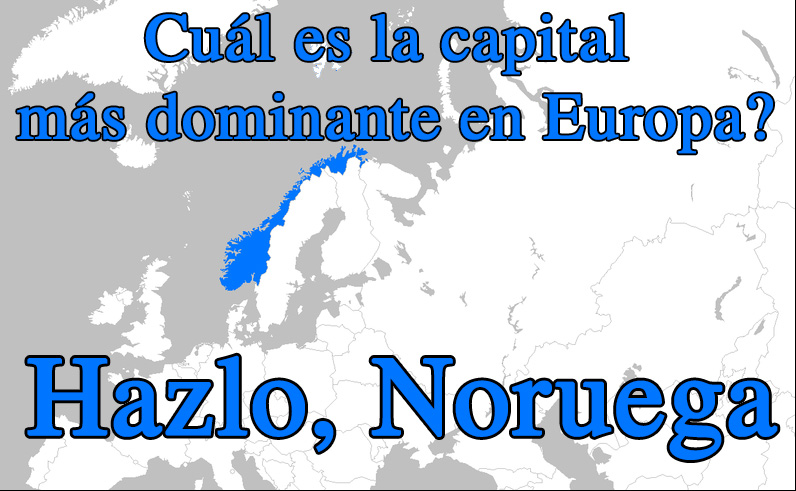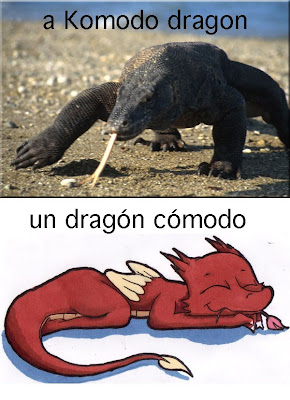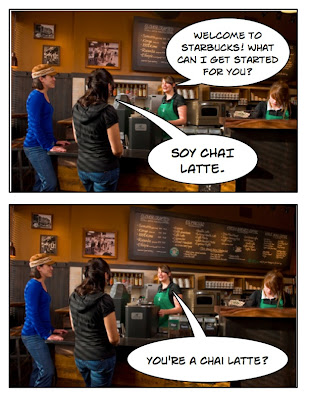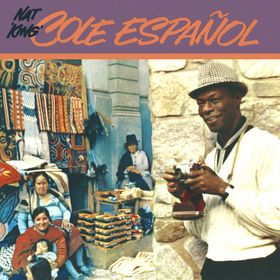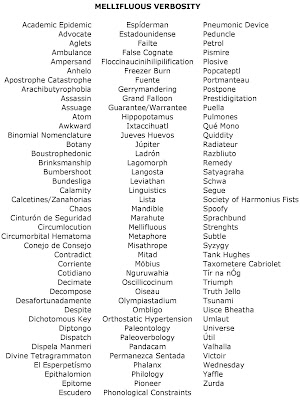{ 0 comments }
January 13, 2014spanish
1. Nueve Reinas (2000)
2. Tango, Nunca Me Dejes (1998)
3. Como Agua Para Chocolate (1992)
4. Mujeres Al Borde de un Ataque de Nervios (1988)
{ 0 comments }
August 2, 2013*This is very like the first Tiny Dissertation post in its curiosity for the answer, its short lifespan, minimal scope of interest, and un-academic treatment of the subject.
Hypothesis: There should be compound words in Spanish songs, because they are very productive in Romance languages, so they should show up in songs.
Data: Lyrics found online for 10 songs in Spanish, each by a different artist, that I listen to a lot but have never thought about in regards to compounds.
{ 0 comments }
April 26, 2012This week in Articulatory and Impressionistic Phonetics, we’re learning about rhotics, otherwise known as ‘r sounds.’ As opposed to fricatives, laterals, or nasals, the class of rhotic sounds do not fit together neatly under a simple definition. They are said in different places in the mouth, with different types of stricture, and with different tongue positions. Ladefoged and Maddieson say there may be phonological, acoustic, or auditory connection, but it doesn’t look like there’s a phonetic one. All of them are oral continuants with neutral lip posture, and they are most clearly linked through their IPA symbols resembling ‘r’ in some way: [r ɾ ɹ ɺ ɻ ɽ ʀ ʁ]. Rhotics are weird. I’m rhotic and proud.
In the seminar about rhotic sounds, we practiced the rhotic trills, which are associated with Spanish and French, and Richard Ogden mentioned that phoneticians have fun by trying to make the 3 trill sounds of the IPA at the same time, which looks something like this: [ʀ͡r͜ʙ]. The diacritic means that the sounds are spoken simultaneously. On paper, I could make the arch go over all three, but this is the best I can do for the internet. The 3 parts are:
- [ʀ] uvular trill – French ‘r’
- [r] alveolar trill – Spanish rolling ‘r’
- [ʙ] bilabial trill – pretend to be a motorboat.
I’ve been bursting into simultaneous trill attempts around campus for the last 24 hours, and wondering if anyone had recorded their attempts. I couldn’t find anything on the internet with the same keywords, so I made my own video and put it on YouTube. It helps to build up from back to front. This has to be done quickly, before the air pressure is lost. Every attempt has ended in giggling, and this video is no exception. Enjoy!
{ 2 comments }
March 6, 2012A few years ago, I took first year Latin at PSU. I didn’t continue Latin because I got a job, and it turns out I hate declining nouns and adjectives. It is three times as much work. The professor was great, seemingly normal, but with a great unexpected affection for Elvis (pronouced Elwees in Latin). I really liked learning the new vocab and connecting it to modern words I know in English, Spanish and French. I also loved conjugating the verbs and learning the four principle parts like in the verb ‘regere,’ to rule or reign: Rego, Regere, Rexi, Rectum.
{ 4 comments }
May 15, 2011I have written or presented about this topic at least 3 times in school, and it still amuses the hell out of me. I have distilled it down to 5 words, but I just found a paper that lists the whole 10, and I think it’s worth recording these down while the information still bubbles and frolicks around for me when I talk about it.
1. Fabular
-Spanish is one of the Romance languages which means it comes from Latin. Other Romance languages include French, Italian, Romanian, Catalan, and Portuguese, unfortunately.
-Fabular means ‘to tell a tale,’ which has morphed over the years to become the verb hablar, to speak. There are many words which begin with ‘f’ in Latin that changed to ‘h’ in modern Spanish. Exceptions are words with a diphthong after the ‘f’ like fuente (fountain), fuerza (force), and fuego (fire). [and then suddenly…]
{ 4 comments }
March 21, 2011{ 0 comments }
September 27, 2010The other day the word ‘quizás’ came up at my office. It means ‘maybe’ in Spanish. The ‘z’ is pronounced lightly, like an ‘s’ in Spanish. I tricked someone into letting me think aloud about where the word might come from. This is that story.
{ 0 comments }
March 11, 2010
Recently I poked and prodded around the internet, Portland libraries, and even had my mother in California send me a book in the mail to get an example of Delfín Carbonell Bassett’s “Unialphabet.”
{ 0 comments }
October 18, 2008